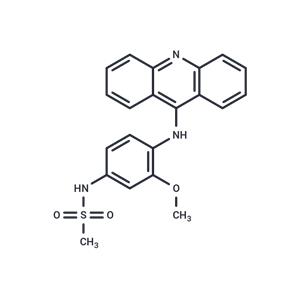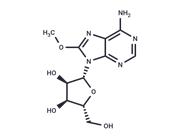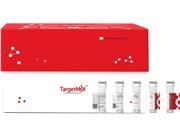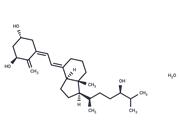| Name | Amsacrine |
| Description | Amsacrine (AMSA) (mAMSA) an antineoplastic agent which can intercalate into the DNA of tumor cells. Amsacrine also expresses topoisomerase inhibitor activity, specifically inhibiting topoisomerase II. |
| In vitro | Amsacrine blocks HERG currents in HEK 293 cells and Xenopus oocytes in a concentration-dependent manner, with IC50 values of 209.4 nm and 2.0 μM, respectively. Amsacrine causes a negative shift in the voltage dependence of both activation ( 7.6 mV) and inactivation ( 7.6 mV). HERG current block by amsacrine is not frequency dependent[1]. In vitro studies of normal human lymphocytes with various concentrations of m-AMSA, show both increased levels of chromosomal aberrations, ranging from 8% to 100%, and increase SCEs, ranging from 1.5 times the normal at the lowest concentration studied (0.005 μg/mL) to 12 times the normal (0.25 μg/mL)[3]. Amsacrine-induced apoptosis of U937 cells is characterized by caspase-9 and caspase-3 activation, increased intracellular Ca2+ concentration, mitochondrial depolarization, and MCL1 down-regulation. Amsacrine induces MCL1 down-regulation by decreasing its stability. Further, amsacrine-treated U937 cells show AKT degradation and Ca2+-mediated ERK inactivation[4]. |
| In vivo | In animals treated with amsacrine (0.5-12 mg/kg), the frequencies of micronucleated polychromatic erythrocytes significantly increase at doses of 9 and 12 mg/kg. This study demonstrates for the first time that amsacrine exhibits high clastogenicity and low aneugenicity, while nocodazole exhibits high aneugenicity and low clastogenicity during mitotic phases in vivo[2]. |
| Storage | Powder: -20°C for 3 years | In solvent: -80°C for 1 year | Shipping with blue ice. |
| Solubility Information | DMSO : 50 mg/mL (127.08 mM)
|
| Keywords | Autophagy | Amsacrine | Inhibitor | Topoisomerase | CI880 | inhibit | CI 880 |
| Inhibitors Related | Stavudine | Sodium 4-phenylbutyrate | Hydroxychloroquine | Guanidine hydrochloride | Taurine | Curcumin | Oxyresveratrol | Paeonol | Naringin | Gefitinib |
| Related Compound Libraries | Pain-Related Compound Library | Bioactive Compound Library | Membrane Protein-targeted Compound Library | Drug Repurposing Compound Library | Inhibitor Library | Anti-Cancer Approved Drug Library | Anti-Aging Compound Library | Bioactive Compounds Library Max | Ion Channel Targeted Library | Anti-Cancer Drug Library |
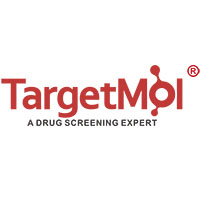
 United States
United States
